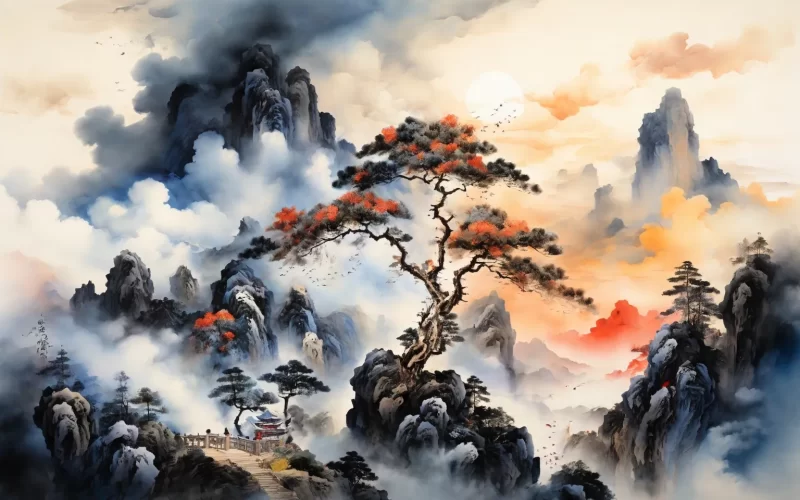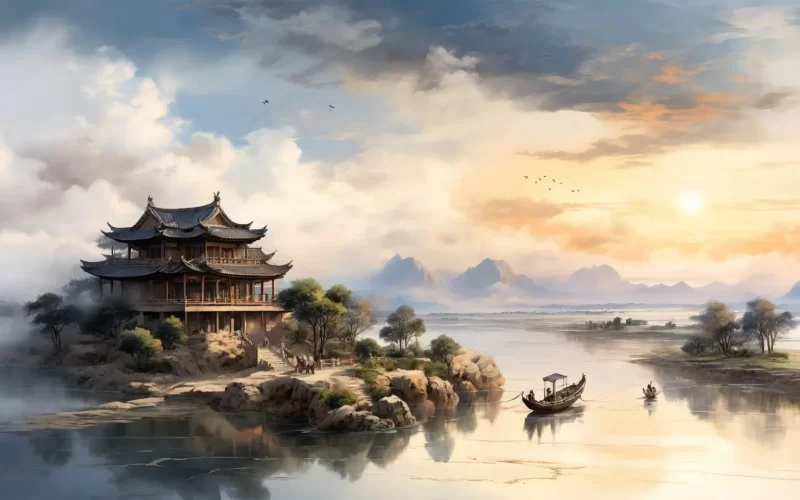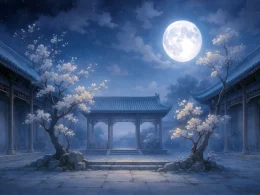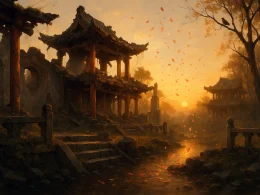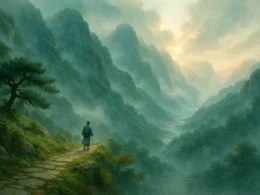Lords of the capital, sharp, unearthly,
The Great Flower's three points pierce through heaven.
Clouds are parting above the Temple of the Warring Emperor,
Rain dries on the mountain, on the Giant's Palm.
Ranges and rivers are the strength of this western gate,
Whence roads and trails lead downward into China.
...O pilgrim of fame, O seeker of profit,
Why not remain here and lengthen your days?
Original Poem:
「行经华阴」
崔颢
岧峣太华俯咸京, 天外三峰削不成。
武帝祠前云欲散, 仙人掌上雨初晴。
河山北枕秦关险, 驿树西连汉畤平。
借问路傍名利客, 无如此处学长生。
Interpretation:
This poem depicts the majestic and awe-inspiring beauty of Mount Hua, while also conveying the poet’s reflections on the fleeting nature of fame and fortune. Huayin, located on the route from Bianliang to Chang’an, was a crucial passage, and as the poet passed through this place, he was struck by the towering grandeur of Mount Hua. In the face of such natural wonder, feelings of detachment and doubt towards worldly struggles for fame naturally arose. The poem masterfully blends magnificent landscapes, historical relics, and profound reflections on life, creating a harmonious fusion of scenery and sentiment, with a deep and far-reaching artistic conception.
First Couplet: “岧峣太华俯咸京,天外三峰削不成。”
tiáo yáo tài huá fǔ xián jīng, tiān wài sān fēng xuē bù chéng.
The towering peaks of Mount Hua lean over the capital of Chang’an; the three distant peaks—Lotus, Jade Maiden, and Morning Star—pierce the sky, their sheer cliffs too steep even for axe or blade to carve.
The first couplet opens with a panoramic view, presenting the imposing and perilous posture of Mount Hua, standing proudly over the Central Plains. The imagery of the three peaks soaring skyward and defying human craftsmanship emphasizes Mount Hua’s supernatural beauty, shaped by the hands of nature itself.
Second Couplet: “武帝祠前云欲散,仙人掌上雨初晴。”
wǔ dì cí qián yún yù sàn, xiān rén zhǎng shàng yǔ chū qíng.
Before the shrine of Emperor Wu, the drifting clouds begin to part; atop Immortal Palm Peak, the rain has just cleared, leaving the forest glistening with freshness.
This couplet shifts to a closer perspective, placing the poet within the mountain itself, observing its ever-changing weather. The transition from rain to clear skies highlights Mount Hua’s ethereal charm and mysterious atmosphere, imbuing the poem with a sense of otherworldly grace.
Third Couplet: “河山北枕秦关险,驿树西连汉畤平。”
hé shān běi zhěn qín guān xiǎn, yì shù xī lián hàn zhì píng.
Mount Hua rests to the north upon the Yellow River, its ridges extending toward the formidable Hangu Pass; to the west, post roads stretch across the plains, leading to ancient Han imperial altars.
Here, the poet expands the scene to encompass both history and geography, situating Mount Hua within a broader historical and cultural context. The Yellow River, the Qin stronghold, and the Han sacrificial sites form a rich tapestry that deepens Mount Hua’s historical resonance, elevating its cultural significance.
Fourth Couplet: “借问路傍名利客,无如此处学长生。”
jiè wèn lù bàng míng lì kè, wú rú cǐ chù xué cháng shēng.
I ask the travelers hurrying by in pursuit of fame and fortune — have you ever considered stopping here to seek the path to immortality?
The final couplet merges scenery with personal reflection, where the poet poses a rhetorical question, contrasting the worldly pursuit of fame with the transcendental quest for eternal life. With a touch of self-mockery, the poet places the worldly seekers and the reclusive immortals in sharp contrast, subtly elevating the poem’s philosophical depth.
Overall Appreciation
The entire poem centers around Mount Hua, skillfully intertwining history with the present, distant views with close-ups, and external scenery with internal contemplation. It gradually unveils the mountain’s towering magnificence, shifting mists, and deep historical roots layer by layer. The poem’s language is grand and vigorous, conveying both visual spectacle and the poet’s profound emotions upon reaching Huayin and gazing up at Mount Hua. The final couplet, which juxtaposes "the seekers of fame" with "those seeking immortality," brilliantly merges personal introspection with social commentary, offering both self-reflection and gentle admonition to all.
Writing Features
- Combination of Distant and Close Perspectives: The poem progresses from distant panoramas to close-up details, then further to historical and personal reflections, creating a clear spatial layering.
- Fusion of History and Nature: The poem blends Mount Hua’s natural beauty with historical landmarks, enriching its imagery with a deep historical sense.
- Harmony Between Scenery and Emotion: The majestic landscape is seamlessly interwoven with philosophical reflections, balancing natural beauty with personal insight, elevating the poem’s thematic depth.
- Powerful and Tense Language: The poet’s language is bold and expansive, creating striking visual impact while conveying subtle and lingering emotions.
Insights
Amidst the stunning and perilous beauty of Mount Hua, the poet experiences the awe of nature’s power and the weight of history, while also contemplating the ephemeral nature of fame and fortune. This process of looking beyond worldly desires toward deeper understanding of self, nature, and history remains profoundly relevant today. The true meaning of life may not lie in the relentless pursuit of fame and wealth, but in the deep contemplation and spiritual connection found in nature and history. This pursuit of spiritual belonging through nature is the poem’s enduring revelation.
Poem translator:
Kiang Kanghu
About the poet:
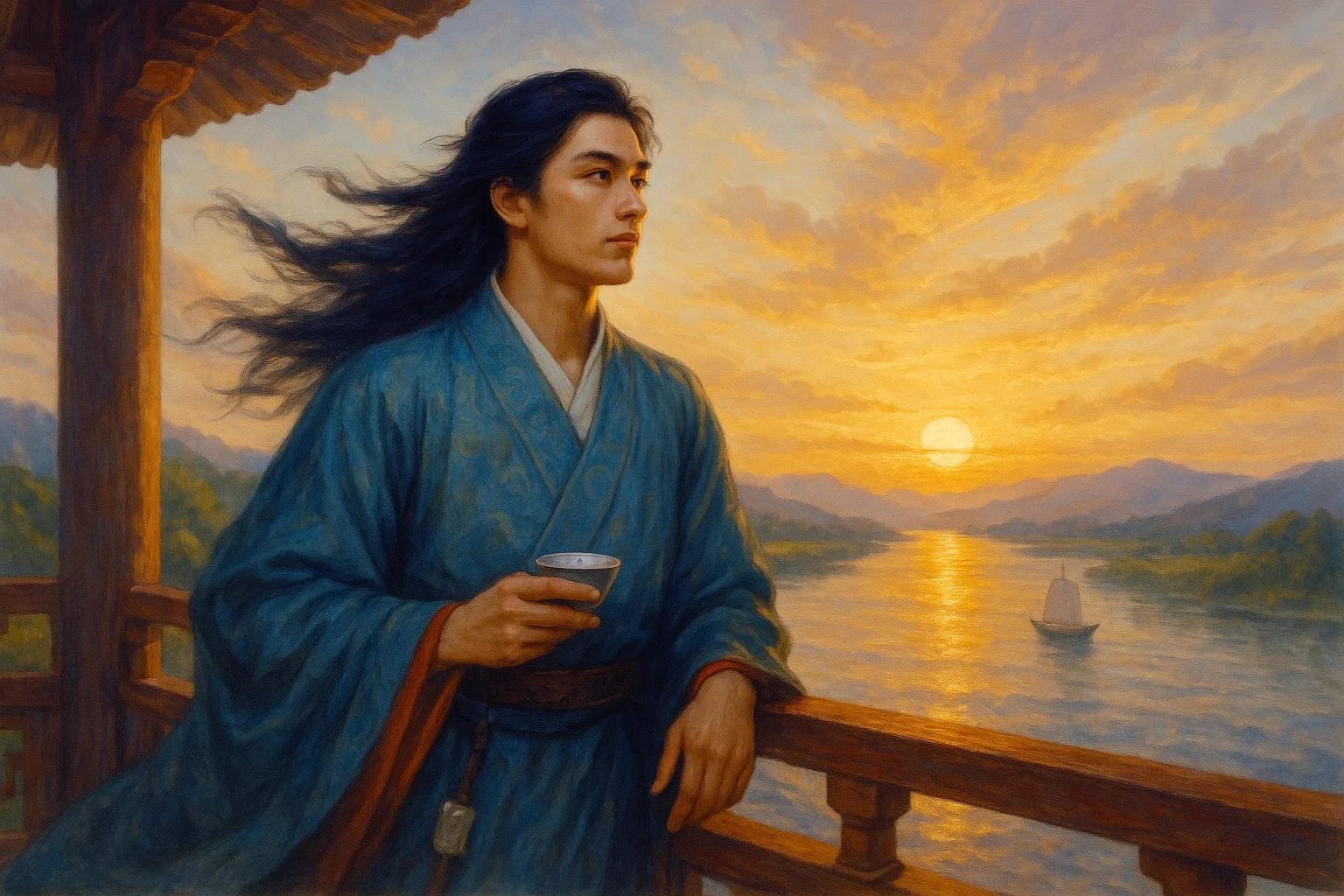
Cui Hao (崔颢), A.D. ? – 754, a native of Kaifeng, Henan Province. He was admitted as a scholar in 723 AD. At that time, Cui Hao was well known, along with Wang Changling, Gao Shi, Meng Haoran, and Wang Wei.






